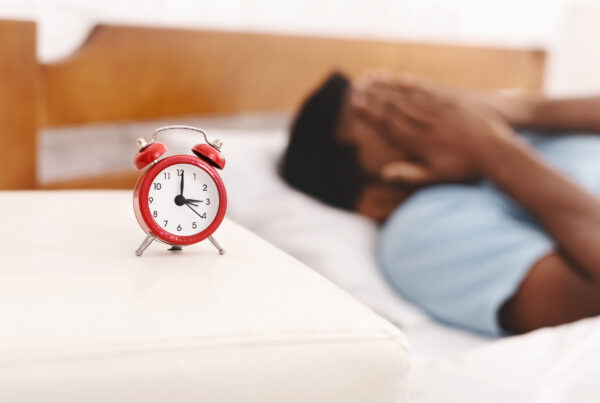”Wyoming, do your sleep and wake times vary a lot day by day? Consistency is one of the best ways to improve and maintain sleep. This week's article explains the power of a consistent sleep schedule. We hope you find this helpful!
Reading Time: 8 Minutes
MWi Hacks:
- Read the top tips on making a sleep schedule that works for you
- Get expert advice on what to avoid when planning a sleep schedule
MWi Summary:
- One of the best things you can do for your sleep is stick to a schedule: go to sleep and wake up at a similar time each day.
- Inconsistent sleep schedules contribute to sleep problems. In some cases, you train your body to only sleep when it is exhausted.
- Pick a sleep schedule that works for you. There is not necessarily a perfect wake up or bed time. It is most important to be consistent with it.
Sleep Schedules: I’d Love to Stay and Chat, but I’m Late for Bed
I have been asked frequently over the years the following question: “What is the single most important piece of advice for achieving your best sleep?” To me, it’s easy: pick a wake up time and stick with it!
When I ask you, “What time do you wake up in the morning?” the answer should be one simple time. If your answer to that question is, “I get up at 6:45 and usually go to the gym or run outside,” you get a gold star.
However, you probably have a problem if you answer something like this: “I usually go to bed at 11:00 except on the weekends when I go out with my friends and we stay out until 2:00 or 3:00 easily. I’m usually up around noon . . . no later than 2:00 p.m. on those days. On Tuesdays I try to go to bed early, like 9:00 because on Wednesday, I have to get up early for this boot camp exercise class. On those days, I go out to my car at lunch and sleep for forty-five minutes. I feel pretty beat by the end of the week and often fall asleep early in the evening. If I do, I struggle to stay asleep and often have trouble falling asleep later. It’s really hard to get up for work on Monday . . . I’m often late. Every now and then, no more than once a month, I’ll use a sick day and stay home from work so I can sleep all day . . .”
Wow, I blacked out there a little bit from acute boredom during that long explanation. But I have to tell you, that was a real patient story. Optimally, an individual should have a consistent bed time and perhaps more important a consistent wake time. Unfortunately, this isn’t usually the case with individuals who have sleep problems. Sleep times can vary wildly in these people and they sadly do not seem to recognize that this haphazard lifestyle is a big part of their problem. In fact, they strangely often see it as working toward a solution.
Some people are in complete control of their sleep schedule. No matter what happens in their lives, they are up at 6:00 a.m. and soon after in the gym getting their BodyPump class on. These individuals are dogs who wag their tails (the dog is in control, and it wags its tail). Other individuals get up and exercise if their evening goes perfectly to plan, but if their sleep is problematic one night, their schedule goes down the tubes. If it takes them an hour or two longer than normal to fall asleep, they ditch their exercise plans and sleep in. For these individuals, their wake time depends on their sleep quality. They are not in control, so instead of the dog wagging its tail, for these individuals, the tail wags the dog. I call them “dog waggers.” Their sleep schedule is dictated by their sleep successes or failures.
Here are some examples of dog waggers:
“I went to bed early last night because I had a rough night of sleep at my girlfriend’s apartment the night before.”
“My alarm went off at 6:00, but since I couldn’t fall asleep until 3:00 a.m., I hit the snooze and called in to work later saying I was sick.”
“My wife was driving me crazy because I masked the basement last month but haven’t painted yet, so I just did it . . . stayed up most of last night to do it. I took a huge nap when I got home from work, now I’m wired.”
When an individual sleeps in this way, all kinds of bad things are happening. You are teaching your body to sleep only when it’s exhausted. Like a cow grazing for food, you’re grazing for sleep. If you are independently wealthy and have no need to work, congratulations! Maybe the schedule of the world doesn’t apply to you and you can keep up your freewheeling schedule as long as you wish. For the rest of us, the world is full of appointments, deadlines and plenty of times we need to be awake.
I joke with my patients all the time that if I can’t fix their sleep problems, they should enlist in the military. The army is such a wonderful environment for sleep. They do everything sleep related perfectly. Their wake up time is precise. Fall out at 5:00 a.m. Tired? You’ll get over that quickly as you and your platoon head out for physical training. Change for breakfast at exactly the same time every day. Activities, more exercise, lunch, dinner, and finally back to bed so you can get up and repeat the exact same schedule the next day. Within a few days of boot camp, you will have all sorts of wonderful and exciting problems . . . falling asleep at night will most likely not be one of them. I always think about these soldiers when a patient tells me he has trouble settling at night because his “mind won’t shut off.” I imagine after a day of engaging in grueling exercise, being screamed at and belittled, and missing your family as you wonder what in the hell you’ve gotten yourself into, you might have some thoughts racing through your mind. But still, these men and women sleep.
So when should you go to bed? When should you wake up? I think you see by now why we have to start with the latter. You need to select a wake time that works for your life. If you have to be at work by 9:00 and your commute is thirty minutes, getting up an hour earlier might work for you. Unless you want breakfast or maybe a shower? Unless you want to exercise or maybe you have kids who need to get up for school? The point is to pick a time that’s realistic. And be sure to include time to actually feel awake.[72] Nobody opens her eyes and feels like Mary Sunshine in the morning, at least nobody over three. So be sure to give yourself some time to go from groggy to human.
One more important detail: There is no such thing as a good or bad wake time. Yeah, depending on your whether you are a night owl or a morning lark, one schedule might work better than another. Are you a morning person? Getting up at 6:00 might be better than noon. Always been a real night owl? That 5:30 a.m. wake time to meet some friends for a bike ride might not be ideal. Brain schedule aside, I’m not here to judge. People in the South talk about sleeping in like they talk about sex: in embarrassed whispers. There is nothing wrong with being a night owl. It’s not a sin.
Establishing a consistent wake time is the most important first step in setting your schedule and solving your sleep issues. Once you’ve picked a wakeup time, the big question is, “How much time do I need to sleep?”
Did you know the average individual eats seven Chips Ahoy! cookies upon opening the bag? Okay fine, I made that number up. But let’s go with it. Now let’s imagine we went to the mall and selected 100 random “average” individuals and gave them each seven cookies. Does that mean every individual would clean his plate? No. Some would eat fewer cookies while others would demand more. Should those who eat less worry about it? No.
We all need different amounts of sleep. Don’t get hung up on magazine articles that demand you sleep eight to nine hours every night for you optimal health. There is a good chance that whatever number they are throwing out at you is not ideal for you specifically.
MWi would like to thank Dr. Chris Winter, for their expert insights shared in his book.
To read the original that is found in his book, please follow this link:
https://www.google.com/books/edition/The_Sleep_Solution/9C1DDgAAQBAJ?hl=en&gbpv=1&printsec=frontcover
More on the Author:
Dr. Christopher Winter has practiced sleep medicine and neurology in Charlottesville, Virginia since 2004, but has been involved with sleep medicine and sleep research since 1993. As the owner of Charlottesville Neurology and Sleep Medicine, CNSM Consulting and the Medical Director of the Martha Jefferson Hospital Sleep Medicine Center, Dr. Winter is not only an active participant in patient care, but a dynamic speaker and researcher on the science of sleep.
Dr. Winter’s current research focuses on sleep and athletic performance. In 2006, Major League Baseball awarded him a grant to study the effect of scheduling and time zone travel on team performance. He has served as a consultant for numerous Major League Baseball (MLB) teams including the Cleveland Indians, Pittsburgh Pirates, San Francisco Giants, Los Angeles Dodgers, and Tampa Bay Rays. In addition, he has worked with the Oklahoma City Thunder, Washington Wizards, and previously with the Chicago Bulls. Within the NHL, he has consulted with the Washington Capitals and currently works with the New York Rangers. He has served with the NFL’s Chicago Bears and the Baltimore Ravens. In addition, Dr. Winter has worked with several collegiate teams to help optimize their sleep. Dr. Winter also consults with the United States Women’s soccer team. His expertise in sleep as it relates to health and fitness led to Dr. Winter being named to the Men’s Health Magazine Health Advisory Board. He regularly appears on Fox News Channel as a sleep and neurology expert and regularly answers readers’ questions about sleep and contributes to its articles as well as articles in Women’s Health, Runner’s World, and Details. He’s also written articles for other magazines including Triathlete and writes a blog entitled Sleeping Around for the Huffington Post. He is thrilled about the release of his debut book, The Sleep Solution, Why Your Sleep Is Broken and How To Fix It. Its hardback release is scheduled for April 4, 2017.






